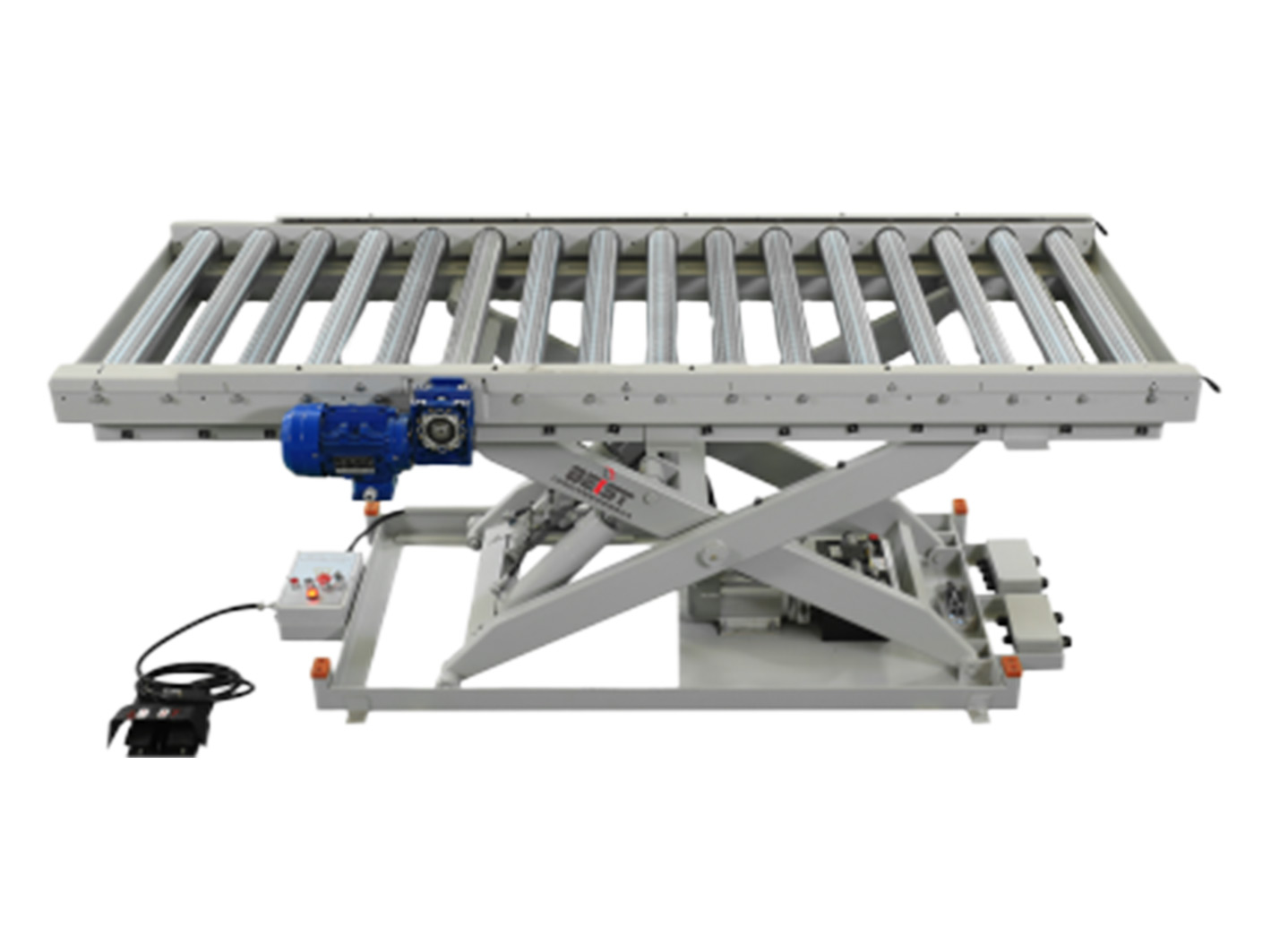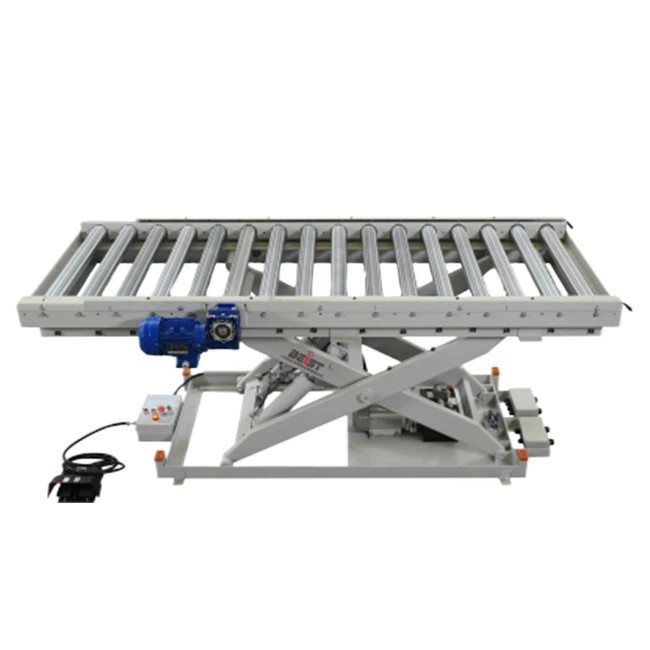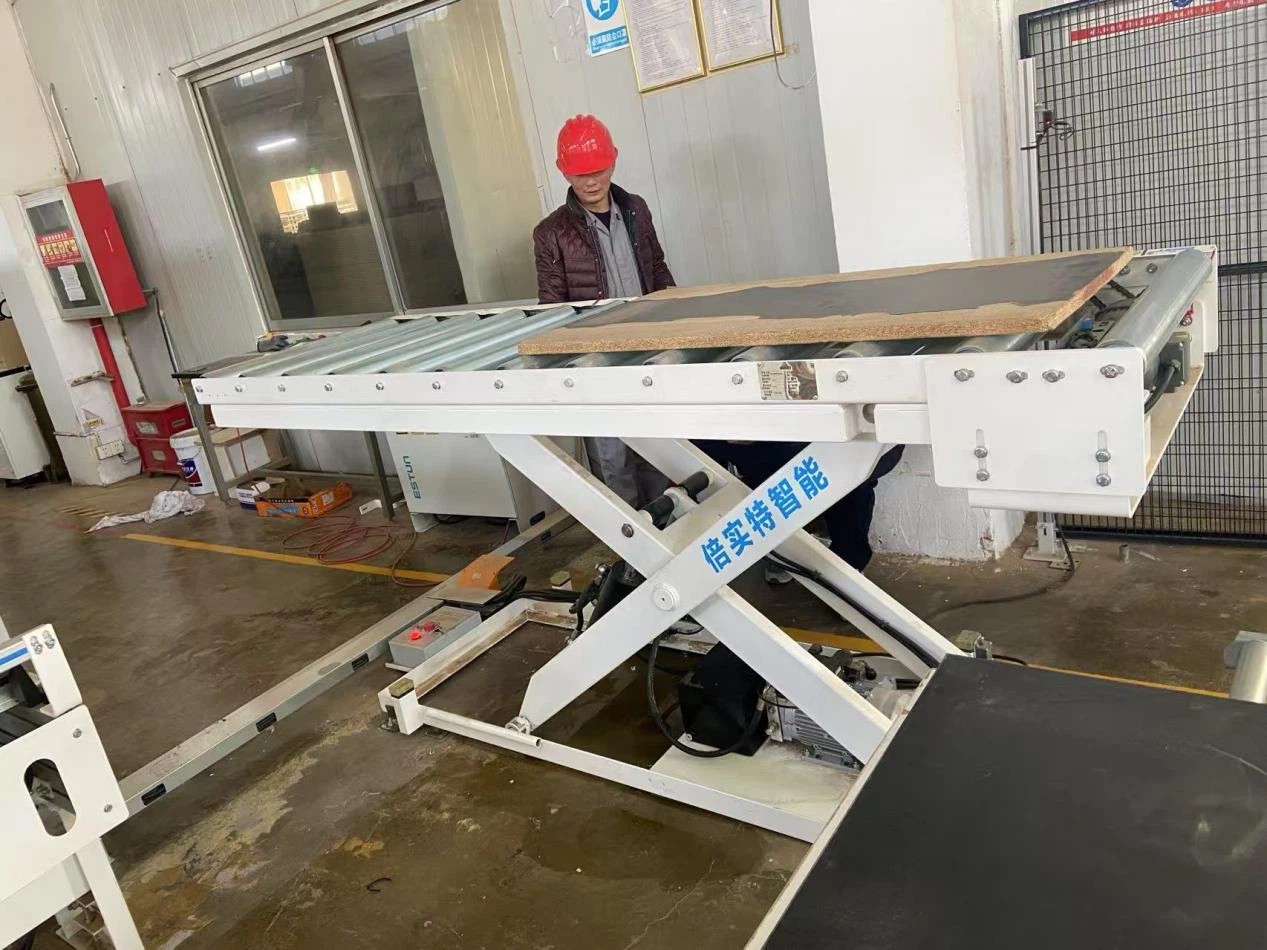
If you want get a more effective production line, you can try our powered roller conveyor lift table. The lift tables have custom-made platforms with roller conveyors on top of them, allowing pallets to get up to the suitable height in order for wood pieces to be stacked on them, and then be rolled along the production line. And as this one is equipped with power, so the efficiency will be much higher.
A powered roller conveyor lift table is an automated material handling system designed to transport goods vertically and horizontally within various industrial environments. These systems utilize powered rollers to facilitate the movement of items along designated paths, enhancing efficiency and safety in operations such as manufacturing, distribution, and packaging.
Their significance is underscored by their widespread adoption across diverse sectors, including automotive, food processing, pharmaceuticals, and e-commerce, where they play a crucial role in optimizing workflows and reducing manual labor. The design and construction of powered roller conveyor lift tables involve careful planning to assess load capacities, dimensions, and environmental factors, ensuring that the systems are tailored to specific operational requirements. Key components include rollers, frames, drive mechanisms, and control systems, all of which work together to provide reliable and efficient material handling solutions. their operational benefits and the necessity for adherence to safety standards.

Specification
|
Table size (mm) |
Height adjustable range (mm) |
Quan(T) |
Mesa function |
control mode |
|
2500*800 |
300-1100 |
1 |
Power roller (brake position available) |
Linkage control |
|
2 |
||||
|
3 |
|
Part name |
Spec |
Quant |
Wood (preparation) |
|
Brake table |
2500*800mm |
1 set |
8# channel steel and 8mm main beam welded |
|
Roller |
Φ89mm |
15sets |
Φ89*3mm galvanized double row sprocket roller |
|
Scissor arm |
2200*120mm |
1 set |
120*40mm rectangular pipe welded |
|
Pedestal |
70*10*6mm |
set |
7# Angle welded |
|
Oil cylinder |
Φ100*50mm |
2 pcs |
Precision cylinder, double seal |
|
Hydraulic power unit |
AC2.2kw/50Hz/380V |
1 set |
High quality hydraulic power unit |
|
Tubing and fittings |
/ |
1 set |
Double wire mesh integrated forming tubing and stainless steel joint clamping |
|
Electric box |
/ |
1 set |
Integrated electric control box, circuit board control |
|
Foot pedal |
/ |
1 set |
Cast iron foot switch, strong and reliable, high silver content contact |
|
Electrical machinery |
1.5kw/50Hz/380v |
1set |
Easy installation, smooth operation, long service life |

Features
Powered roller conveyor lift tables offer a variety of advantages that significantly enhance operational efficiency, safety, and productivity in material handling applications.
Increased Efficiency
One of the primary benefits of powered roller conveyor lift tables is their ability to automate the movement of goods, resulting in a seamless flow of materials across different stages of production and distribution. The efficiency gained from these systems translates directly into increased productivity, as tasks that once required considerable time and effort can now be completed more swiftly.
Flexibility and Customization
Powered roller conveyors are highly customizable, enabling businesses to adapt the system to their specific needs. Options for straight, curved, and even spiral designs allow for effective space utilization in various settings. This flexibility not only optimizes the material handling process but also allows businesses to respond quickly to changing operational demands.
Enhanced Safety
The design of powered roller conveyor lift tables emphasizes safety by minimizing the physical strain on workers. With reduced manual transportation of heavy goods, the likelihood of accidents and injuries decreases
Ergonomic Improvements
Improved ergonomic conditions lead to higher employee morale, better job satisfaction, and increased overall productivity, creating a positive feedback loop that benefits both employees and employers.
Cost Savings
By minimizing the risk of injuries, companies can reduce healthcare and workers' compensation costs. Moreover, the efficiency of these systems can decrease operational costs associated with labor and energy use, making them a financially sound investment for businesses aiming to enhance their material handling operations.